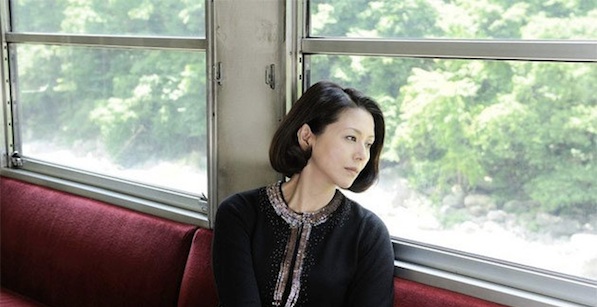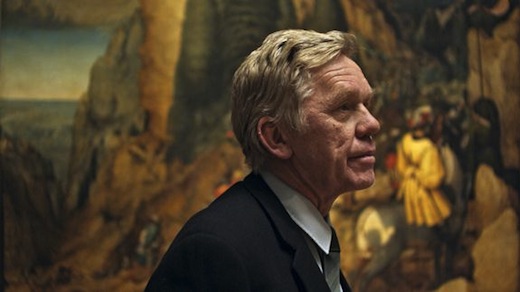Reporting from Pacific Film Archive, the East Bay venue for the San Francisco International Film Festival, located on the edge of the UC Berkeley campus, one experiences more concentrated cinephilia, devoid of San Francisco glamor despite the attendance of filmmakers. The Q&As are a bit more ascetic, the questions more rigorous and the films are usually the best in fest.
It was the perfect venue for viewing Kiyoshi Kurosawa’s Penance, a five-hour-long TV production, each hour of which probes the long-term effect on one witness of the murder of a little girl, and the demand by the victim’s mother of an act of penance by all witnesses. The first two episodes are rivetingly incisive about Japanese society’s attitudes toward female submissiveness, workplace bullying and men who prey on children. The third chapter deals, unusually for contemporary Japanese films, with income disparity, but then the fourth chapter veers into soap-opera territory and the fifth chapter is anticlimactic. Kurosawa tries to “creepify” scenes by staging them in abandoned or half-finished workspaces fitted with tattered plastic sheeting buffeted by gale-force winds, almost like a parody of his previous and truly chilling works.
The performance by Kurosawa regular Kagawa Teruyuki was a letdown, but he is brilliant in another SFIFF selection, Uchida Kenji’s Key of Life, a true screwball comedy involving switched identities. Uchida plays clichés such as an amnesiac hitman and a suicidal Method actor like Legos, creating hilarious new structures before they fall apart. At the Q&A Uchida was offered a teaching position at his alma mater San Francisco State, where he fell in love with the screwball genre. I peg this one for the narrative audience award, judging from the lively audience response and an added San Francisco screening.
PFA made sure to present the more interesting restorations and revivals. Although tech glitches hobbled their screening of the Film Foundation’s gorgeously restored The Mattei Affair, Francesco Rosi’s 1972 paean to the businessman martyr who tried to steer a state-owned petroleum industry, and Italy, into the top ranks of oil-producing entities. In line with the numerous early reports of digital projection glitches involving soundtrack and title syncing issues on the San Francisco side—and of a piece with technical problems suffered by notable East Coast festivals—PFA suffered, on the first tryout of its newly installed 4k digital projector, with stalled subtitles during one of Enrico Mattei’s talkathons and was never quite able to catch up.
These days I breathe a sigh of relief when I see a film on 35mm, knowing that a glitch on celluloid won’t necessarily mean a total ruination of the film. Czech director Frantisek Vlácil’s 1966 epic Marketa Lazarová,on lustrous black and white film, was screened in honor of the late George Gund III, longtime chair of the board of directors of the San Francisco Film Society. It’s an elliptical and poetic saga of a savage medieval feud between a clan of highwaymen and a feudal lord that leads to the abduction of the lord’s beloved daughter who was destined for the nunnery. I wouldn’t pretend to know what was going on in every scene, and sometimes I was as lost as one of its wandering souls in the snowy woods. But I’m satisfied that it’s a brutal, hallucinatory meditation on pagan versus Christian belief and relations between fathers and children in 13th-century Bohemia. The choral soundtrack evokes the apocalyptic power of medieval-era films like Bergman’s The Seventh Seal.
For modern tales, I recommend two seagoing films, both based on true stories. I saw Danish director Tobias Lindholm’s A Hijacking at Palm Springs in January, where the Scandinavian theme included several seagoing adventure films like Kon-Tiki, The Deep and the documentary Stolen Seas. A Hijacking is Stolen Seas’ fictionalized counterpart, a superbly nerve-wracking rendering of a 2009 incident in which the Danish cargo ship CEC Future was boarded by Somali pirates and became the pawn of a months-long negotiation.
Just as realistic but more emotionally moving, Senegalese director Moussa Touré’s The Pirogue pushes us (reluctantly, speaking for myself) and 30 West African men into an ominously open wooden boat of the title, barely 50 feet in length, for a journey from Dakar to Spain that should last a week. Thankfully this is not a ship of fools or stock types, so when the going gets rough—and it gets very rough—their fates are not foregone conclusions. Andrew Schenker is right in noting that Touré is “a shrewd quick sketch artist” of several distinctive characters, who come alive through ethnic and religious conflicts and alliances.
Two films about art have stayed with me for months and weeks after viewing. I saw Spanish filmmaker Fernando Trueba’s The Artist and the Model at a Telluride winter event back in December and re-viewed it on screener. Another spectacularly beautiful black-and-white production, this film is set in occupied France near the Spanish border during World War II and depicts an elderly, artistically blocked sculptor (Jean Rochefort) who rediscovers his creativity when his wife (Claudia Cardinale) brings him a homeless young woman (Aida Foch) whose legs are covered with mysterious scratches. With few words and a great deal of (nude) bodily expressivity, we learn the process of sculpting and the need to form an “idea” with which to create. A scene in which the two interpret a rough Rembrandt drawing reveals that the beautiful model is not just a passive muse, and her intimacy with the artist brings the sculpture to life.
A less straightforward but remarkably compelling contemplation of art and humanity is American Jem Cohen’s Museum Hours, which I saw on screener. A docent at Vienna’s Kunsthistorisches Art Museum comes to the aid of a vulnerable Canadian visitor, and the two strike up a relationship that echoes the museum’s paintings (mainly by Bruegel the Elder) that the docent also considers intimate friends. If it weren’t for a mid-film misstep, in which an art historian has a self-conscious and stilted Socratic dialogue with her listeners, I would remember this as a spellbinder. But nothing can detract from the poignancy of a song the Canadian woman (played by singer Mary Margaret O’Hara, Catherine’s sister) sings, or the warmly improvised conversations that show a friendship growing deeper.






